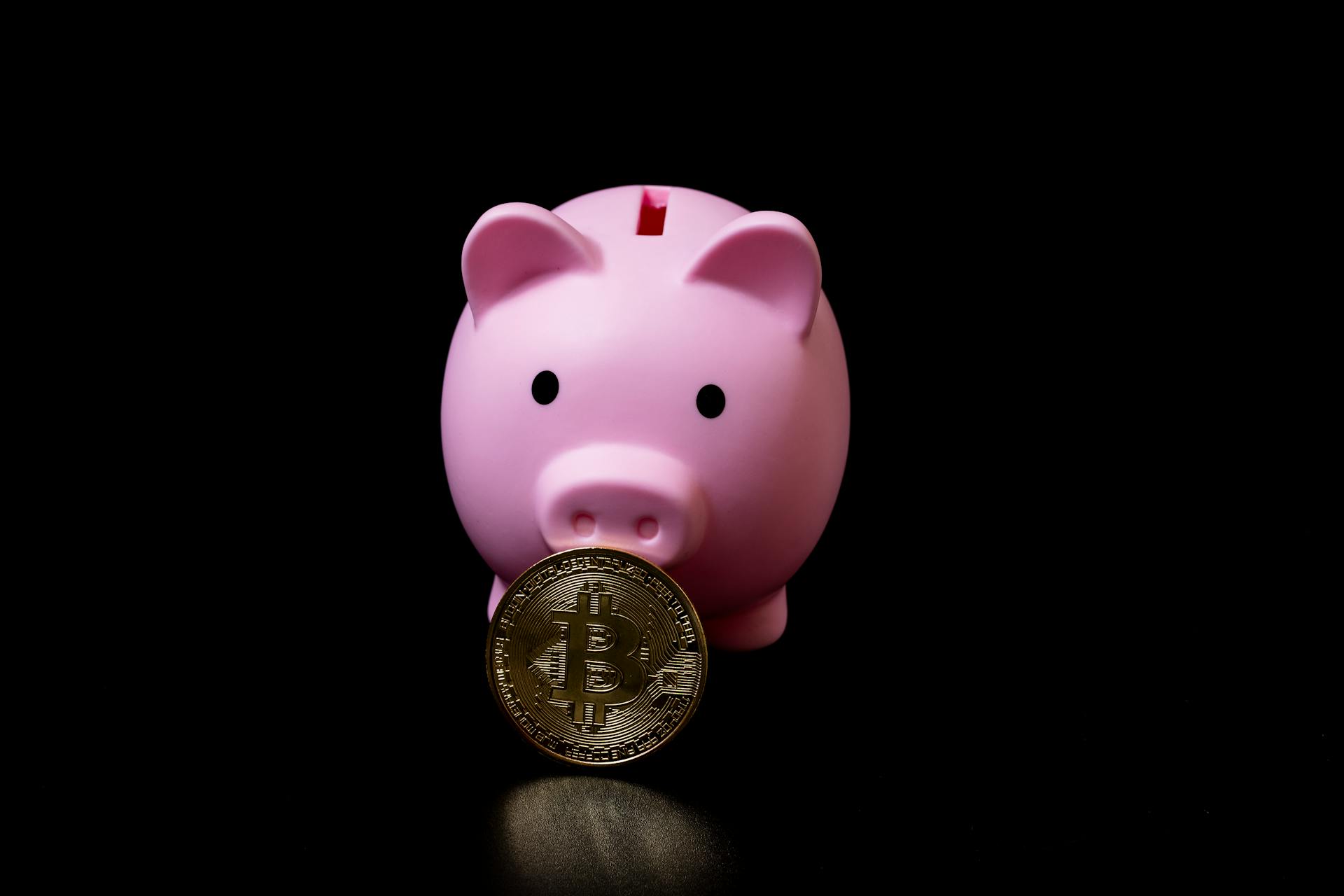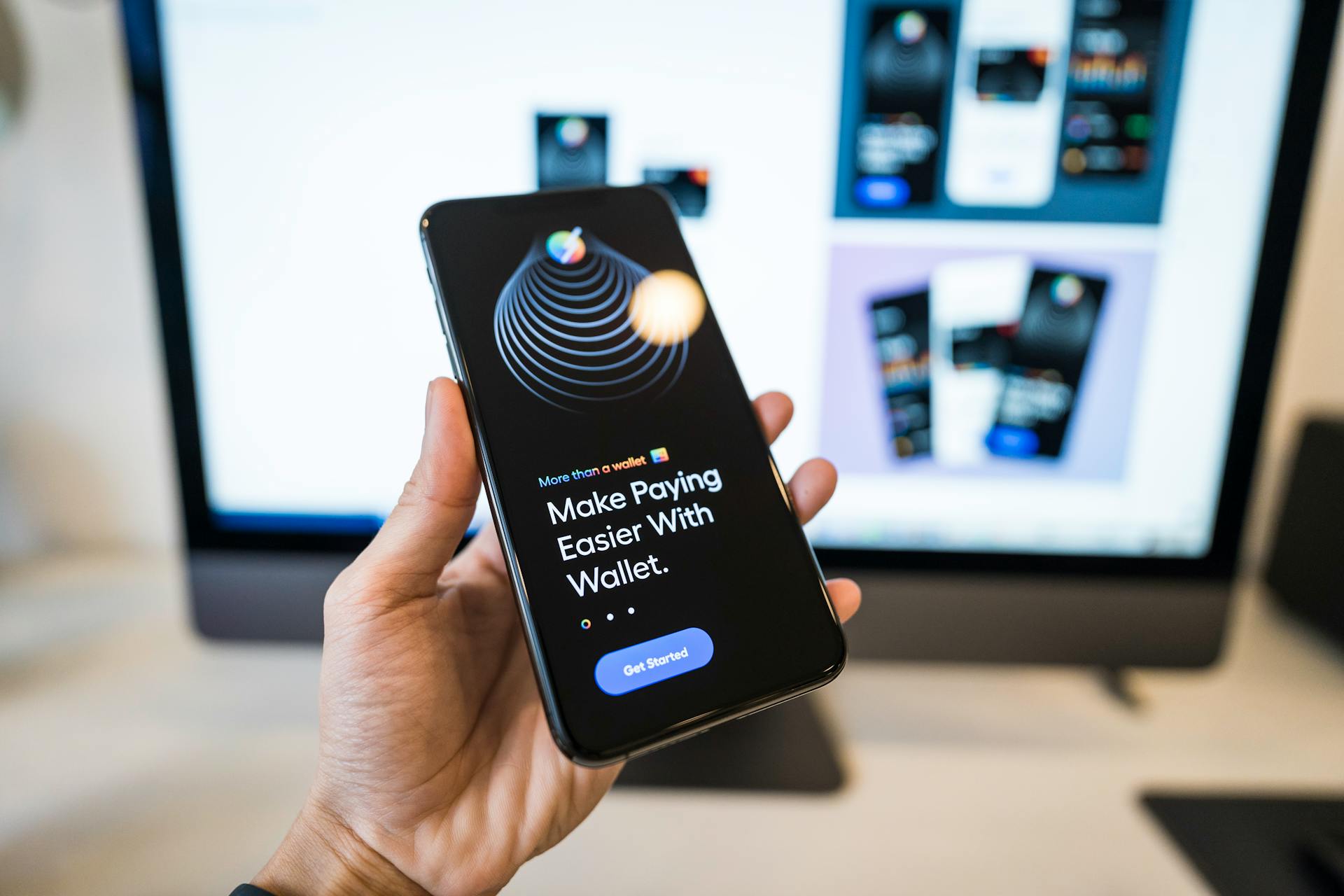
Digital wallets and mobile wallets are often used interchangeably, but they're not exactly the same thing.
A digital wallet can be accessed through a mobile device, but it's not limited to just mobile devices - it can also be accessed through a computer or other device. Digital wallets often store credit card information, but they can also hold other types of payment information like bank accounts and loyalty cards.
Mobile wallets, on the other hand, are specifically designed for mobile devices and use Near Field Communication (NFC) technology to make payments. Mobile wallets are often tied to a specific mobile device and can't be accessed from other devices.
The most popular mobile wallet is Apple Pay, but Google Pay and Samsung Pay are also widely used.
For more insights, see: Atm Card Can Be Used to Withdraw from Checking Account
What Is
Digital wallets are a way to pay from financial accounts via computer, smartphone or a smart device. They eliminate much of the need to carry around an actual wallet.
Some popular digital wallets include Apple Pay, Google Pay, and Samsung Pay. PayPal and Venmo are also popular options, uniquely social by allowing you to easily send money to retailers and friends.
Digital wallets are not the same as crypto wallets, which are often used to buy cryptocurrency.
How it Works
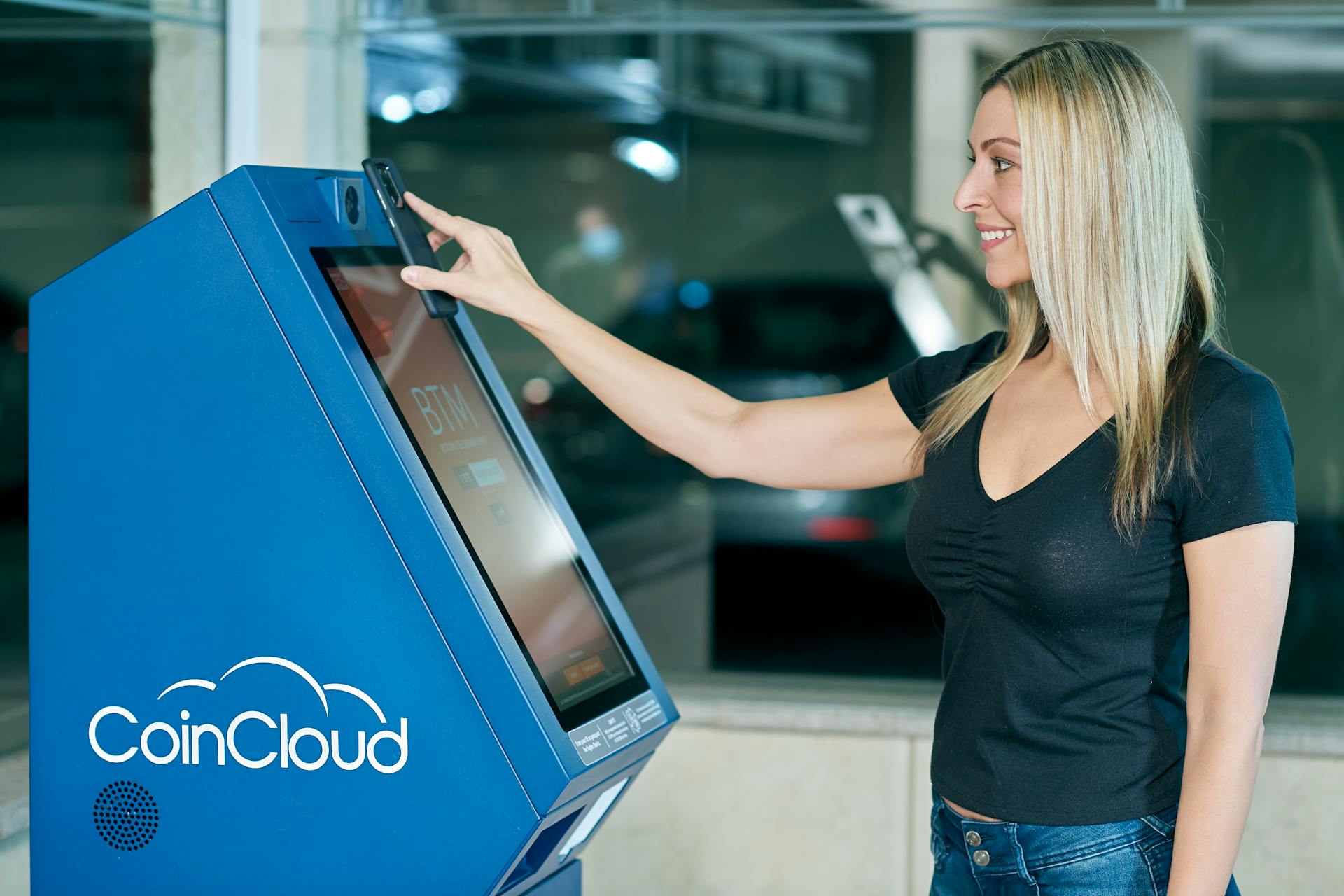
Digital wallets are applications that store your payment information securely on your mobile device, eliminating the need to carry a physical wallet. They use your device's wireless capabilities like Bluetooth, WiFi, and magnetic signals to transmit payment data.
You can initiate payments using various technologies, including QR codes. These are matrix bar codes that store information, which you scan with your device's camera and the wallet's scanning system.
Near field communication (NFC) is another technology used by digital wallets. It allows two smart devices to connect and transfer information using electromagnetic signals, requiring them to be close to each other.
Magnetic secure transmission (MST) is also used, but it's primarily for Samsung mobile phone users. It's the same technology used by magnetic card readers that read your card when you swipe it through a slot at a point of sale.
To make a payment, the card information you've stored in your wallet is transmitted from your device to the point-of-sale terminal, which is connected to payment processors. The payment is then routed through the credit card networks and banks.
Explore further: Technology behind Credit Cards

Here are the different payment technologies used by digital wallets:
- QR codes: Quick response codes that store information and are scanned with your device's camera.
- Near field communication (NFC): Allows two smart devices to connect and transfer information using electromagnetic signals.
- Magnetic secure transmission (MST): Uses magnetic waves to transmit data, similar to swiping a credit card's magnetic stripe.
Benefits and Features
Digital wallets offer a range of benefits and features that make them an attractive alternative to traditional payment methods.
Accepting digital wallet payments can enhance both the customer experience and financial processes, as it streamlines transactions and reduces the risk of fraud.
Digital wallets can also provide security for your credit cards and identification, limiting exposure to financial and personal information.
By storing multiple types of cards in a digital wallet, you can free up pocket space and carry less, reducing the risk of losing your wallet.
Digital wallets often come with added protection, such as data encryption and tokenization, making them safer than traditional debit or credit card transactions.
You can also store other important documents, such as boarding passes, hotel reservations, and concert tickets, in a digital wallet, making it a great place to keep everything organized.
Here are some of the key features of digital wallets:
- Credit or debit cards
- Boarding passes
- Hotel reservations
- Concert tickets
- Gift cards
- Coupons
- Loyalty rewards cards
Digital wallets also offer convenience, allowing you to make payments quickly and easily, and eliminating the need to carry physical payment cards.
Understanding Your Online Safety
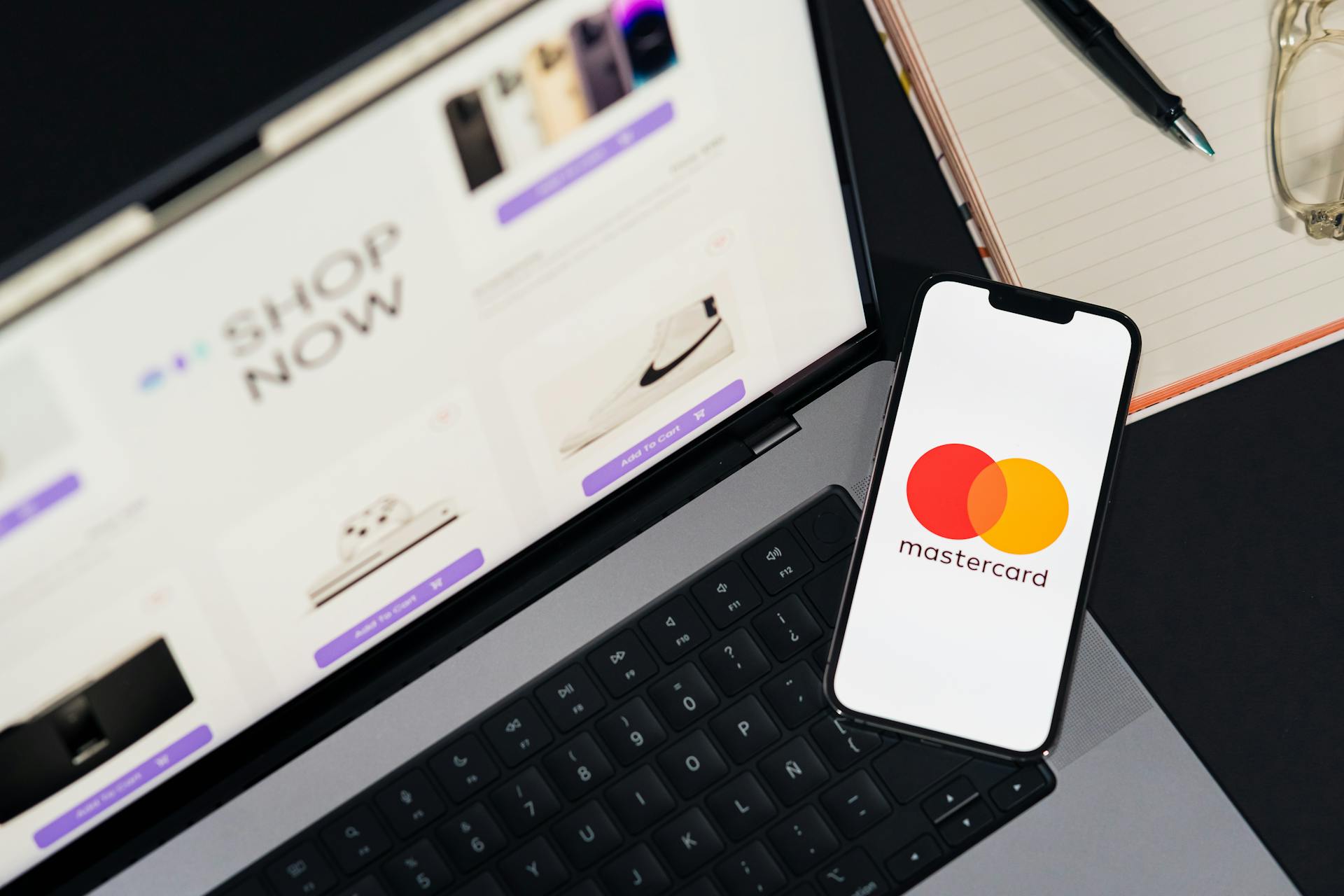
Digital wallets are a convenient way to make payments, but safety is a top concern. You can rest assured that digital wallets use cutting-edge security to protect your information.
Both Magnetic Secure Transmission (MST) and Near Field Communication (NFC) technologies are used to transmit your card information to the payment terminal directly, without swiping or inserting your card into a card reader.
Public Wi-Fi isn't secure, so avoid using it to access sensitive data. Public Wi-Fi creates an opportunity for thieves to access your information.
Digital wallets use a digital token, usually a 15- to 16-digit number, rather than your card number, so your information is never stored on your phone or transmitted to the merchant. The token information is stored by a token service provider.
You should enable your phone's security features and keep them updated – this is the first line of defense between your information and hackers.
If this caught your attention, see: Take Contactless Payments on Phone
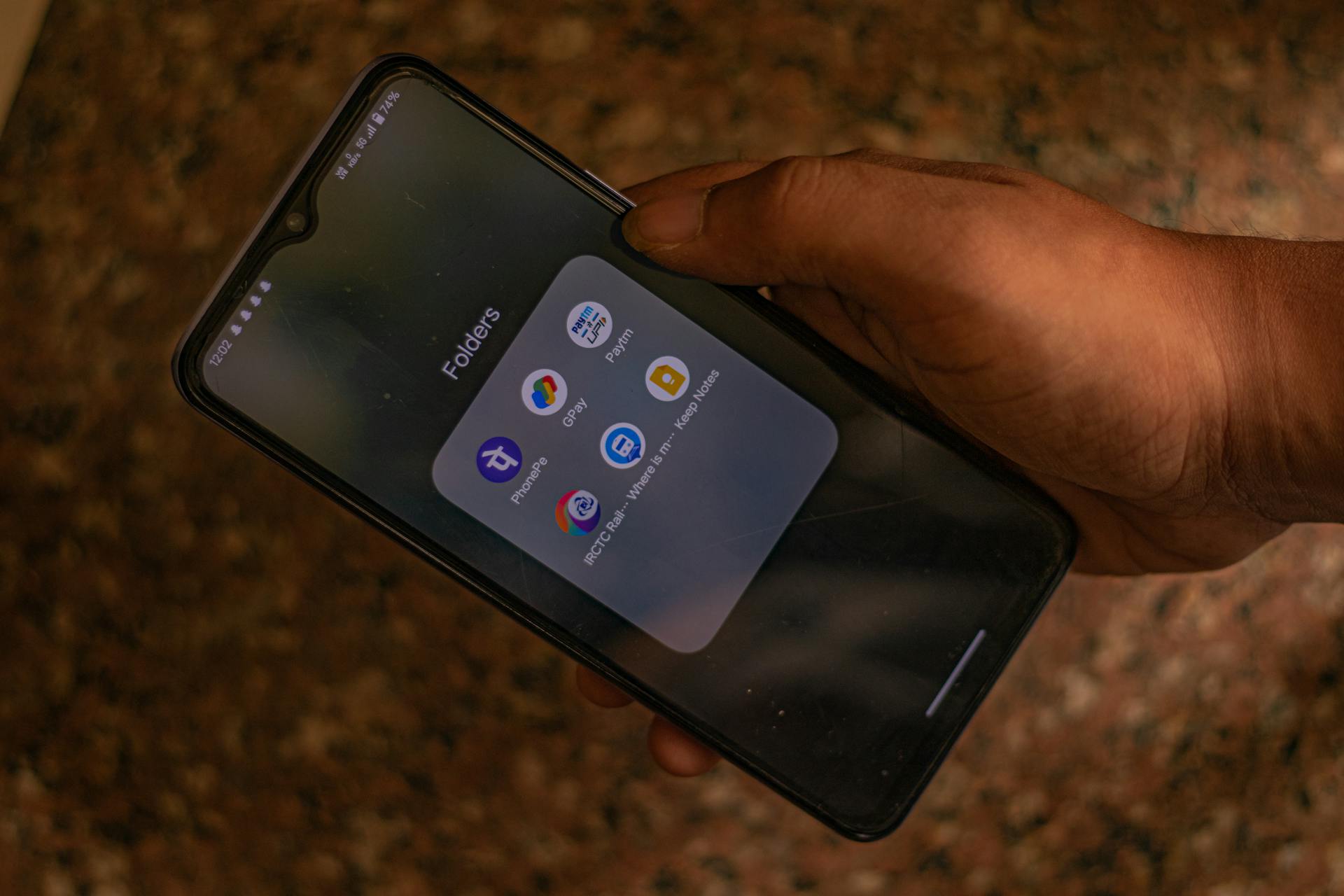
Here are six steps to protect your digital wallet:
- Protect your smartphone or watch with a password, fingerprint or other biometric authentication
- Don't use public Wi-Fi to access sensitive data
- Be suspicious of malicious software
- Be vigilant and avoid clicking random links in texts or emails
- Enable your phone's security features and keep them updated
- Keep an eye on your accounts and report any suspicious activity
Digital wallets are available to consumers free of charge, and they're fairly easy to obtain.
Using a Digital Wallet
Using a digital wallet is a convenient way to make payments, store data, and more. You can use it to make payments at stores that accept digital wallets, which will have a contactless symbol on their point-of-sale terminal.
Digital wallets can be used for several purposes, including making payments, storing data, and more. To use a digital wallet, you'll need to store your payment information within the app.
Stores that accept digital wallets will list this as an option at checkout, and e-commerce merchants will also have it as an option at checkout. This makes it easy to use a digital wallet for online purchases.
Customers love having choices, and accepting e-wallet payments can entice buyers to frequent your business. This is because customers can pay even if they forgot their physical wallet in their car.
You can also use a digital wallet to make deposits into your bank account using just your phone or mobile device. This integration allows you to add your debit card or bank account information to your digital wallet.
See what others are reading: What Store Gives the Most Cash Back on Debit Card
Payment Process
When you use a digital wallet like Google Pay or Apple Pay, the payment is routed through the participating credit card networks and banks to send payment to the merchant's account.
The merchant relies on a compatible point-of-sale terminal to process payments.
This terminal is connected to a payment processor, which is necessary for transactions to go through.
Payments are sent directly to the merchant's account, making the process seamless and efficient.
Expand your knowledge: Merchant Bank Id Credit Card Authorization
Business and Technology
Digital wallets offer a secure and efficient way to process payments, with secure and fair electronic payment systems being an essential aspect. This is thanks to the software component, which provides security and encryption for personal information and transactions.
Server-side digital wallets are gaining popularity among major retailers due to their security, efficiency, and added utility, increasing customer satisfaction. These wallets are maintained on the organization's servers.
Digital wallets can be used in various forms, including mobile payments systems and digital wallet applications. In Asia, one in every five consumers are now using a digital wallet, representing a twofold increase from two years ago.
Broaden your view: Four Corners Model for Payment Security
Payment Processors
Payment processors are the backbone of online transactions, enabling merchants to receive payments from customers. They work behind the scenes to facilitate payments, routing transactions through participating credit card networks and banks.
To accept payments, a merchant needs a compatible point-of-sale terminal connected to a payment processor. This setup allows for seamless transactions, whether customers use Google Pay or Apple Pay.
Adding multiple payment methods is a common feature, enabling merchants to accept both credit and debit card payments. This flexibility makes it easier for customers to choose their preferred payment option.
Readers also liked: Venmo Business Transaction
How Businesses Can Benefit
Accepting digital wallet payments can enhance both the customer experience and your financial processes.
Customers love choices, and not everyone likes using debit or credit cards when shopping. Accepting e-wallet payments also allows customers to pay even if they forgot their physical wallet in their car.
Digital wallets make it even easier to access your financial data since every payment is immediate and automatically stored. This helps you analyze consumer trends and spending habits, allowing you to adjust your inventory and budget accordingly.
For another approach, see: Does Ally Accept Credit Card Payments
European Payments Initiative
The European Payments Initiative (EPI) is making waves in the digital payments landscape.
With the acquisition of iDEAL, EPI is creating an all-European digital wallet.
This move has significant implications for the way we make payments across the continent.
The digital wallet will provide a seamless and secure payment experience for consumers and businesses alike.
Here are some key aspects of the EPI digital wallet:
- Digital currencies will be supported, offering users a range of payment options.
- Payment systems will be integrated, making it easy to make payments online or in-store.
Comparison and Decision
Digital wallets and mobile wallets may seem like interchangeable terms, but they're not exactly the same thing. Mobile wallets are a form of digital wallet most often used on mobile devices.
A digital wallet can run on any connected device, not just mobile devices, making it a more versatile option. This flexibility is a significant advantage for people who use multiple devices in their daily lives.
One of the biggest advantages of digital wallets is that they let you pay for things without credit or debit cards, once you enter and store your card and banking information in the mobile payment platform. This can be a huge convenience for people who prefer not to carry cash or cards.
Do I Need?
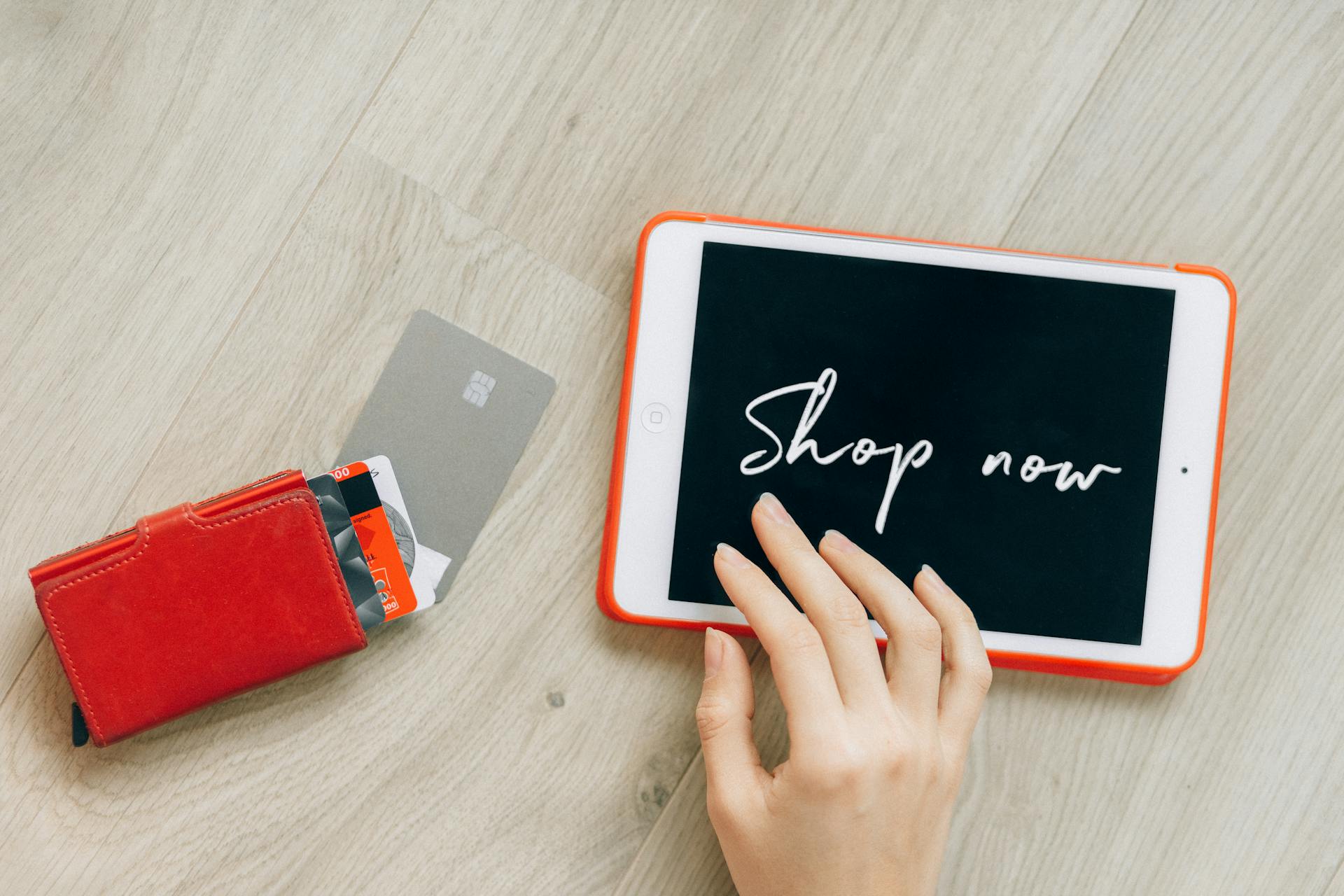
Do I Need a Digital Wallet?
You don't necessarily need a digital wallet, but they offer a convenient way to pay for your purchases without carrying credit and debit cards.
One of the biggest advantages of digital wallets is that they let you pay for things without credit or debit cards, once you enter and store your card and banking information in the mobile payment platform.
Digital wallets increase card security – you can't lose your cards if you don't carry them.
Here are some questions to consider when deciding if you need a digital wallet:
- Is the app compatible with my phone?
- Is the app accepted at most retailers?
- Does the company have a solid security reputation?
Ultimately, it's up to you to weigh the pros and cons of different digital wallet providers.
Advantages and Disadvantages
Digital wallets offer several advantages, including the ability to limit exposure of financial and personal information, end carrying a physical wallet and cards, and improve access to financial services in underserved areas. This can be especially helpful for those in underserved communities who may not have access to traditional banking services.
See what others are reading: Gcash Apple Services
One of the main benefits of digital wallets is convenience. You can store multiple types of cards in the digital wallet, freeing up pocket space and making it easier to carry around. Additionally, digital payments have the added protection of data encryption and tokenization, making them safer than traditional debit or credit card transactions.
Digital wallets also eliminate the need to carry physical payment cards, and you don't need a bank account at a physical branch. This can be a big advantage for those who live in areas with limited banking services. Moreover, digital wallets eliminate the hassle of losing your wallet and the need for physical contact or touching POS systems when making payments.
However, there are some potential drawbacks to consider. Possible security issues can arise when using a lesser-known app, and other people can potentially gain access to your information if your phone isn't protected. Additionally, some e-wallet apps are not compatible with all mobile devices.
Here are some of the main advantages and disadvantages of digital wallets:
Overall, digital wallets can be a convenient and secure way to make payments, but it's essential to weigh the pros and cons before making a decision.
Types and Systems
There are several types of digital wallets available, including Cash App, Apple Pay, Google Wallet, Samsung Wallet, PayPal, Venmo, AliPay, and Walmart Pay. Each has its own unique features and uses.
Some digital wallets, like Google Wallet, allow you to add funds directly to the wallet on your phone or device. This can be a convenient option for making payments on the go.
Other digital wallets, such as Apple Pay, have formed strategic partnerships to expand their services. For example, Apple partnered with Goldman Sachs to issue Apple credit cards.
A closed digital wallet is one that only supports payment to the wallet issuer. Walmart Pay is an example of a closed wallet, limiting its use to purchases at Walmart.
Some digital wallets, like Venmo, offer social features that set them apart from others. You can view and comment on friends' transactions in addition to making or requesting payment.
Here are some examples of popular digital wallets:
- CashApp
- Apple Wallet
- Samsung Wallet
- Google Wallet
- PayPal
- Venmo
- Zelle
Because different types of digital wallets offer different features and uses, you may find yourself using more than one.
Featured Images: pexels.com
